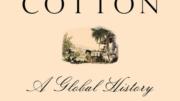Bell professor of history Sven Beckert has won a 2015 Bancroft Prize in history for his book Empire of Cotton: A Global History, the trustees of Columbia University announced this afternoon. His fellow winner is Greg Grandin, a professor at New York University, who won for The Empire of Necessity: Slavery, Freedom, and Deception in the New World.
Beckert, whose work and book were featured last fall in this magazine’s “The New Histories,” co-chairs both the Program on the Study of Capitalism and the Weatherhead Initiative on Global History at Harvard; the latter is premised on the belief that much of history can be fully understood only in a global context, and the book is an exemplar of that mode of inquiry.
The official announcement called Empire of Cotton “a masterful achievement in the burgeoning field of the study of capitalism…an expansive global history that also helps us rethink the history of the United States, lifting our understanding of American slavery, cotton production, the Civil War, and Reconstruction out of the parochial confines of nation-centered history. Deeply researched across four continents and cogently argued, it is a book that will have lasting value for students of the United States and the 19th-century world.”
Beckert is also author of The Monied Metropolis: New York City and the Consolidation of the American Bourgeoisie (2001) and numerous articles, as well as editor of collections on American and global history. With a group of students, he has also studied the historical connections between Harvard and slavery, which led to the publication of Harvard and Slavery: Seeking a Forgotten History.
The Bancroft Prizes, presented annually, include an award of $10,000.









